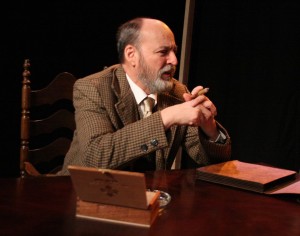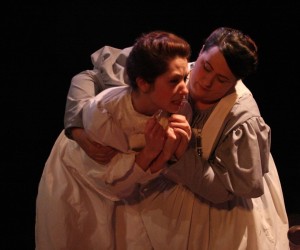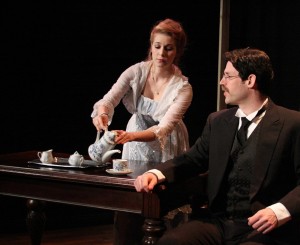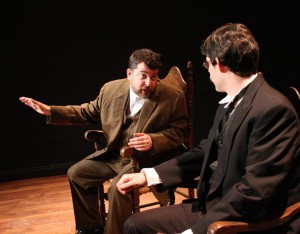SHRINK, ENLARGE THYSELF!
Christopher Hampton’s dramas are marvels of complicated construction, starting in the past and finding us fast. A retelling of the “creation myth” of psychoanalysis, this variegated 2002 offering is compelling in its Chicago premiere by Idle Muse Theatre Company. The Talking Cure contrasts Sigmund Freud (Vincent Mahler) and Carl Jung (Patrick Doolin). The figurative father and son of a new, non-medical healing process indulged in a family feud that soon divided the discipline they founded. Hampton’s 170-minute thinkfest chronicles the schism that undermines the infancy of psychotherapy: Telling differences emerge, triggered in part by their very different approaches to Russian émigré Sabina Spielrein, a patient who would become a colleague.
Sexually traumatized and masochistically-inclined, this troubled Jewish teenager (Caty Gordon, ranging wildly and powerfully) was a textbook example of Freud’s favorite diagnosis–“female hysteria”. Sabina seems almost perversely stimulated by humiliation and degradation, a sick hunger that makes her susceptible to transference and manipulation. Jung’s first patient also becomes a paradigm for and an exemplum of what will be called the “talking cure”–enlightenment through horizontal confessions (and little eye contact between doctor and patient): After enough weeks on a couch, repression supposedly gives way to reality and a patient is freed from a painful past.
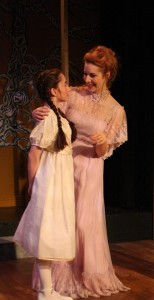 Jung, not Freud, is the first to treat this neurasthenic virgin, quivering with anxiety triggered by memories of abuse. He soon takes a more than professional interest in this vulnerable and talented sufferer–who will become an analyst in her own right. The married mentor, whose wealthy wife (Mary-Kate Arnold) is too fecund for his comfort, begins an affair with Sabina that, of course, crosses many lines and persists, never quite embraced or rejected, for years.
Jung, not Freud, is the first to treat this neurasthenic virgin, quivering with anxiety triggered by memories of abuse. He soon takes a more than professional interest in this vulnerable and talented sufferer–who will become an analyst in her own right. The married mentor, whose wealthy wife (Mary-Kate Arnold) is too fecund for his comfort, begins an affair with Sabina that, of course, crosses many lines and persists, never quite embraced or rejected, for years.
In time mistress Sabina moves from Jung to Freud and Zurich to Vienna, preferring Freud’s emphasis on actual trauma to Jung’s increasing “oceanic” penchant for mysticism (the “collective unconscious”). Jung (inventor–and illustrator–of the word “complex”) fears that Freud overemphasizes sex over less blatant influences (like the force of “unborn communal instincts”). It’s fascinating to watch Jung improvise now-established tools of psychiatry as he employs word-association tests or resolves to speak less and listen more.
Adding to this mix of methods is the somewhat extraneous case of colleague Otto Gross (Nathan Pease). For this sybaritic, cocaine-addicted rebel, freedom, not adjustment, is the end of treatment. His anarchic abandon incarnates the Id, the dark force that Freud, Jung and Adler would combat with very different strategies.
Caught between dueling diagnoses, Dr. Spielrein functions as a kind of muse for these masters. They may project onto her their public and private theories, but her unresolved mysteries escape them both. (Her terrible end at the hands of the S.S. is ripped out of chronology and brutally ends the first act.) By play’s end Jung must confront the fact that people commit unpardonable sins in order to survive.
Thanks to Evan Jackson’s masterful direction, Doolin’s Jung and Mahler’s Freud run the playwright’s fascinating gamut very well indeed. Gordon’s divided and divisive Sabina becomes a living ghost who inspires and defies the new psycho-science. Delusions and revelations abound–and once again theater proves that it’s the ultimate “talking cure.”
photos by Steven Townshend
The Talking Cure
Idle Muse Theatre Company
Rivendell Theatre, 5779 N Ridge Ave.
Thurs – Sat at 8; Sun at 3
scheduled to end on March 22, 2015
for tickets, call 773-340-9438 or visit www.idlemuse.org
for more info on Chicago Theater, visit www.TheatreinChicago.com

